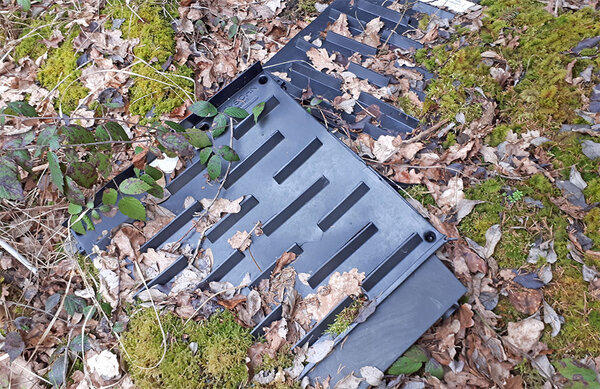Forschungsschwerpunkt "Plastikreduktion im Wald" vertieft sich
Veröffentlicht am: 23. September 2025
BMLEH fördert ab sofort neues Verbundprojekt der HFR mit nova-Institut und Universität Münster

Das Bundesministerium für Landwirtschaft, Ernährung und Heimat (BMLEH) fördert über seinen Projektträger Fachagentur für Nachwachsende Rohstoffe e.V. (FNR) das Forschungsprojekt: „Perspektiven für biobasierte und bioabbaubare Kunststoffe in Land- & Forstwirtschaft - Wissensaufbau, Analyse & Lösungen zu Anwendersicht, Produkteigenschaften und Unternehmenskompetenzen [PerPlacsBio]“. Die HFR führt dabei innerhalb des Verbundes mit der Universität Münster (Institut für Landschaftsökologie) und dem NOVA-Institut für politische und ökologische Innovation GmbH das Teilvorhaben 2 „Erhebung der Anwendung und Praktiken & Dialog mit der Land- und Forstwirtschaft“ durch.
Die schädlichen Auswirkungen auf die Umwelt sowie die Gefahren für landwirtschaftliche Erträge durch Mikroplastik sind bekannt, allerdings fehlt es an Praktiken und Informationen, wie der Kunststoffeintrag tatsächlich reduziert werden kann, ohne gleichzeitig den Vorteil der Nutzung (wie die Reduzierung von Pestizideinsatz durch das Abdecken mit Kunststofffolien) aus dem Blick zu verlieren. Die Verfügbarkeit von Bio-Kunststoffen als mögliche Alternative zu konventionellen Kunststoffen in Land- und Forstwirtschaft ist noch nicht ausreichend erforscht und kommuniziert. Das Ziel des Projekts ist es daher, Bewusstsein und Wissen zu einem nachhaltigen Einsatz von (Bio-) Kunststoffen in Land- und Forstwirtschaft zu erfassen und zu schaffen, um so die Mikroplastikbelastung in der Umwelt zu senken und die Ökosystemdienstleistungen des Bodens zu schützen und zu erhalten. Dafür ist es grundlegend, die Perspektiven und Erfahrungen aus der Land- und Forstwirtschaft in die Forschung und Entwicklung nachhaltiger Lösungen einzubeziehen. In einem Prozess der ko-kreativen Wissensproduktion soll der jetzige Informationsstand ausgebaut und so strukturiert werden, dass fundierte Entscheidungen bei der Kunststoffverwendung getroffen werden können. In einem Zeitraum von zwei Jahren soll in dem Projekt zunächst erhoben werden, inwiefern sich Betreiber*innen der Land- und Forstwirtschaft mit den Folgen der Nutzung von (Bio)Kunststoffen auseinandersetzen und Maßnahmen zur Vermeidung von Mikroplastik in Böden und Gewässern ergreifen oder vorschlagen. Dabei bearbeitet das NOVA Institut die Wissensgrundlagen zur Entscheidungsfindung, wo zum Beispiel Biokunststoffe sinnvoll eingesetzt werden können. Die Universität Münster und die HFR führen im Dialog mit Land- und Forstwirt*innen u.a. Interviews und Workshops durch, um die Umsetzbarkeit der gemeinsam erarbeiteten Maßnahmen zu analysieren.
Ansprechpersonen:
Prof. Dr. Sebastian Hein, hein@hs-rottenburg.de
Luka Kiener, kiener@hs-rottenburg.de
Weitere Informationen:

Research focus on ‘Plastic reduction in forests’ intensifies: BMLEH is now funding a new joint project between HFR, nova-Institut and the University of Münster.
The Federal Ministry of Agriculture, Food and Regional Identity (BMLEH) is funding the research project ‘Prospects for bio-based and biodegradable plastics in agriculture and forestry – knowledge building, analysis and solutions from the user's perspective, product properties and corporate competencies [PerPlacsBio]’ through its project management agency Fachagentur für Nachwachsende Rohstoffe e.V. (FNR). Within the consortium with the University of Münster (Institute for Landscape Ecology) and the NOVA Institute for Political and Ecological Innovation GmbH, HFR is carrying out sub-project 2 ‘Survey of applications and practices & dialogue with agriculture and forestry’.
The harmful effects of microplastics on the environment and the reduction of agricultural yields are well known, but there is a lack of practices and information on how the input of plastics into the soil can actually be reduced without losing sight of the advantages of their use (such as the reduction of pesticide use through the covering of crops with plastic sheeting). The environmental compatibility of bioplastics as a possible alternative to conventional plastics in agriculture and forestry has not yet been sufficiently researched. The aim of the project is to raise awareness and knowledge about the sustainable use of (bio-)plastics in agriculture and forestry in order to reduce microplastic pollution in the environment and to protect and maintain the ecosystem services of the soil. To achieve this, it is essential to incorporate the perspectives and experiences of agriculture and forestry into research and development of sustainable solutions. In a process of co-creative knowledge production, the current state of information is to be expanded and structured in such a way that more informed decisions can be made when using plastics. Over a period of two years, the project will initially survey the extent to which agricultural and forestry operators are dealing with the consequences of the use of (bio)plastics and are taking or proposing measures to avoid microplastics in soils and water. The NOVA Institute is developing the knowledge base for decision-making, for example, where bioplastics can be used sensibly. The UM and the HFR are conducting interviews and workshops, among other things, in a dialog with farmers and foresters to analyze the feasibility of the jointly developed measures.
Contact:
Prof. Dr. Sebastian Hein, hein@hs-rottenburg.de
Luka Kiener, kiener@hs-rottenburg.de